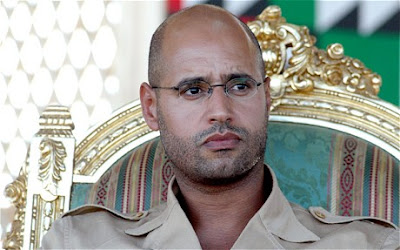Saif al-Islam al-Qadaffi is reportedly considering turning himself in to the International Criminal Court, which has issued a warrant for his arrest. He likely fears the possibility of a brutal, extrajudicial 'YouTube execution' if he remains in Libya.
The Libyan NTC has opposed Saif al-Islam's extradition, preferring to try him in Libya if captured. The latter option would certainly lend credibility and legitimacy to the NTC; furthermore, an ICC trial could take many years. "Libya's new rulers might not be satisfied with the idea of him spending the next decade playing board games with Ratko Mladic," wrote Joshua Keating on Friday.
Many remain skeptical that Saif al-Islam is sincere about surrendering to the ICC. Let us suppose that Saif al-Islam, who is possibly hiding in the desert somewhere near the Libyan border, has the means to make his way to safety. By Monday, he might be able to board a plane without interception, as NATO military operations will have ended.
Aside from the Hague, where might Saif al-Islam be looking to go? While many countries do not recognize the ICC, the following countries are rumored to be the most likely options:
1. Sudan, Zimbabwe, or Algeria. None of these countries recognize the ICC; Zimbabwe enjoyed good relations with Colonel al-Qadaffi. Several al-Qadaffi family members are currently exiled in Algeria.
2. Venezuela. Chavez has not made any public offers to grant Saif al-Islam asylum, but has refused to recognize the new Libyan government. He was an old ally of the elder al-Qadaffi.
3. Niger or Mali. According to the Daily Telegraph, another one of al-Qadaffi's sons, Saadi al-Qadaffi, currently has asylum in Niger. However, Niger and Mali recognize the ICC.
While the symbolic value of capturing Saif al-Islam commands attention in the present, the more profound challenge lies elsewhere, namely building a transparent, democratic, accountable republic in Libya.
 |
| Above: Saif al-Islam. via the The Daily Telegraph. |
Many remain skeptical that Saif al-Islam is sincere about surrendering to the ICC. Let us suppose that Saif al-Islam, who is possibly hiding in the desert somewhere near the Libyan border, has the means to make his way to safety. By Monday, he might be able to board a plane without interception, as NATO military operations will have ended.
Aside from the Hague, where might Saif al-Islam be looking to go? While many countries do not recognize the ICC, the following countries are rumored to be the most likely options:
1. Sudan, Zimbabwe, or Algeria. None of these countries recognize the ICC; Zimbabwe enjoyed good relations with Colonel al-Qadaffi. Several al-Qadaffi family members are currently exiled in Algeria.
2. Venezuela. Chavez has not made any public offers to grant Saif al-Islam asylum, but has refused to recognize the new Libyan government. He was an old ally of the elder al-Qadaffi.
3. Niger or Mali. According to the Daily Telegraph, another one of al-Qadaffi's sons, Saadi al-Qadaffi, currently has asylum in Niger. However, Niger and Mali recognize the ICC.
While the symbolic value of capturing Saif al-Islam commands attention in the present, the more profound challenge lies elsewhere, namely building a transparent, democratic, accountable republic in Libya.


